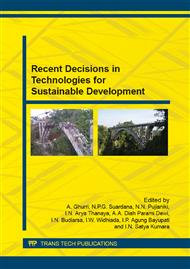p.108
p.114
p.121
p.127
p.133
p.139
p.145
p.151
p.157
Modeling Discharge of the Bangga Watershed under Climate Change
Abstract:
The purpose of this research is to create a model of the discharge as the impact of climate change due to global warming. The study was conducted using data from the Bangga watershed. Monthly water balance model used is the development of a model FJ. Mock by entering the natural phenomena that occur at this time such as climate change, canopy interception, rainfall distribution based on land use, soil type and soil characteristics. Calibration of water balance is used to determine the performance of the models to variations in climate change. Then, analysis is conducted as the effect of rain and temperature on runoff at river Bangga. The conclusion of this research were: 1) Accuracy of discharge simulation models against observed discharge is quite good, which is characterized by the Nash coefficient (Ns) close to one except for a few periods and annual rainfall runoff ratio (RE) approaches one. 2) Changes in rainfall have a considerable influence on the runoff, while the effect of temperature on runoff is not too significant.
Info:
Periodical:
Pages:
133-138
DOI:
Citation:
Online since:
July 2015
Keywords:
Price:
Сopyright:
© 2015 Trans Tech Publications Ltd. All Rights Reserved
Share:
Citation:


